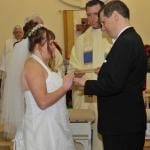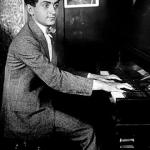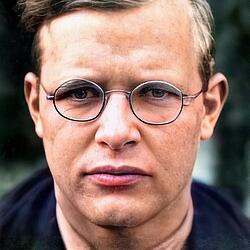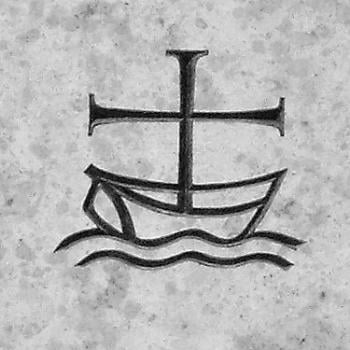For your spiritual edification
here is a selection from the public domain work
Holy Mass (1907)
by
Mother Loyola
(1845–1930)
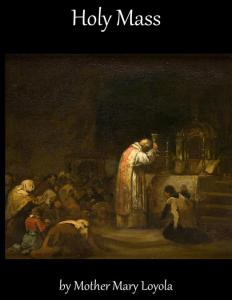
There are those amongst us, who, to the close of a long life, will remember their thrill of awe when it was first told them that Jesus Christ, Who once walked this earth of ours, so worshipped, so hated, and so loved; Who lay on the straw and was glorified by Angels; Who worked in the carpenter’s shop, and trod the waves of the sea; Who hung helpless on the Cross, and by His own power rose from the dead – is with us still. His going away at the Ascension was not a parting, for as truly as He dwelt at Nazareth and Capharnaum, and was visited by His friends for instruction, or sympathy, or relief. He is with us now. This truth, when it comes – not like the gradual dawn, as to the Catholic child, but like the sudden flash of light from the heavens – makes a moment in life whose memory no length of years can obliterate.
But to all of us it is only the pondering of this wondrous fact that reveals to us what it means; that enables it, little by little, to work its way into our mind, and heart, and life, till we come to see that the Real Presence is, or should be, simply everything to us.
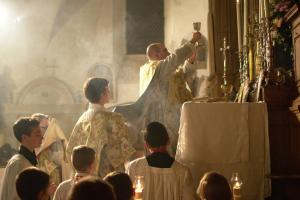
There, on the altar, is He Who for us became Man, and worked for His daily bread, and died a death of shame, and Who for each one of us renews in His Sacramental Life the mysteries of the three and thirty years. No need to look longingly to a past growing dimmer and dimmer in the distance; to days when we might have met Him travel-stained on a dusty road in Galilee; or watched Him in breathless admiration from the water’s edge as He taught from Peter’s boat; or made our way to Him at night to speak with Him as friend to friend. He is here now, to be to us what He might have been then. He loves us, each one of us, too dearly to shut us out from the mysteries of His blessed life on earth. He would make Bethlehem, and Nazareth, and Calvary realities to us, not only by the memory that recalls them, and the grace laid up in them for us, one by one, to be had for the asking, but by the renewal of them in the abiding marvel of His Real Presence which the Church calls “a remembrance of all His wonderful works.”
Is He not as little here as in the Crib where He would have taught us by His own example to be meek and humble of heart? May we not learn of Him here self-sacrifice for the Glory of God and the help of others, and gentle patience, and persevering prayer, as we should have learned by watching Him in His humble home, or at His daily toil, or in the Garden of the Agony? Can we not, like Magdalen, come to Him to have our sins forgiven? The help and consolation His Sacred Person brought to those who saw and heard and touched Him during His life on earth – this indeed is wanting to us. It was this the Apostles craved for when He told them that He was going where they could not follow Him. But to us as to them He left His real though unseen Self. To us as to them He says that it is not expedient, that is, not best for us yet, to see and hear and touch Him. This happiness will be ours by and by, as a reward of the faith by which we now believe without seeing, and make our profit of the divine Keepsake He has left, to be a treasury of all good to us, our resource in the cares and temptations and sorrows of life.
A Catholic was trying to impress on a Nonconformist teacher in a Sunday School the necessity of an infallible authority in religious matters. “Suppose,” she said, “that one of your class were to ask you point-blank whether Christ, when He said at the Last Supper ‘This is My Body,’ meant just what He said, or not – what would you answer?”
“I think,” said the other, after a moment’s hesitation, “that I should either evade the question, or say we don’t know, or that it is better not to discuss difficult questions, but to keep to what is essential and necessary.”
What a reply! “Evade the question,” or own to ignorance, when she was there as a teacher; or speak of the Real Presence of Christ in our midst as a detail too trivial to deserve attention! Did it matter to Magdalen whether or not He sat at meat in the house of the Pharisee? Did it concern the fever-stricken of Capharnaum, and the blind and the dumb, that He was coming down the street laying His hands on all? or make any difference to the fishermen on the Lake in their fast-filling boat that He was with them in the storm?
Shall anyone dare tell us it is not necessary to know what Our Lord meant by His plain and most solemn words when He was leaving this world – to know whether His blessed Presence has been withdrawn from us or not? Are we not all of us sinful, and suffering, and storm-tossed? Who that is not utterly heedless of the needs of his own soul and of the needs of others, shall put aside as a thing of no moment the question that is one of life and death to us all – “is Jesus Christ true God and true Man, still on this earth, still within our reach?”
Let no one, quoting Our Lord’s words: “It is the spirit that quickeneth, the flesh profiteth nothing,” say: “He is with us as God to hear and help at all times.” So He was from the beginning. But only since His coming amongst us as man, only by the touch of His sacred virginal flesh, has healing for soul and body gone out from Him in the marvelous way the Gospel story and the history of His Church attest. Because it was His will that this should be, He laid His hands on the eyes of the blind, and touched the lepers’ sores. In no way has He shown Himself more truly our Brother, one of the human family, like to us in all things, than in willing to make our contact with His sacred human nature the source of every good to us.
Therefore He has left It always within our reach. Yes, Jesus Christ is with us still, with us all days even to the end of time.
When at the Last Supper He held the consecrated Bread before the eyes of the Twelve and said: “This is My Body,” He gave them His very Self. And with Himself He gave the faith which – ^thanks to His mercy – is ours also, the faith which takes Him at His word, and with adoration and thanksgiving and love accepts His Unspeakable Gift.
But in the Blessed Sacrament Our Lord is more to us than Companion, and Friend, and Physician, more even than our Guest, harbored in our very hearts in Holy Communion. He is our High Priest and our Victim, by Whom we can pay to the full all that as creatures we owe to our Creator. To be able to do this worthily and perfectly is our greatest need, as we should feel if our hearts were unspoiled by sin and selfishness.
The Greatness of God, His Almightiness, His Wisdom, His Presence everywhere, His Beauty which shows itself in all His works, call for our adoration. His Goodness by which He has made us for everlasting happiness, claims our deepest thankfulness; whilst the injustice and ingratitude with which we have treated Him, and our many wants of soul and body, oblige us to beg pardon for our sins, and to ask Him to provide us with all we need. These four acts, Adoration, Thanksgiving, Propitiation, and Supplication, are the duty of every human creature as reason itself shows us.


